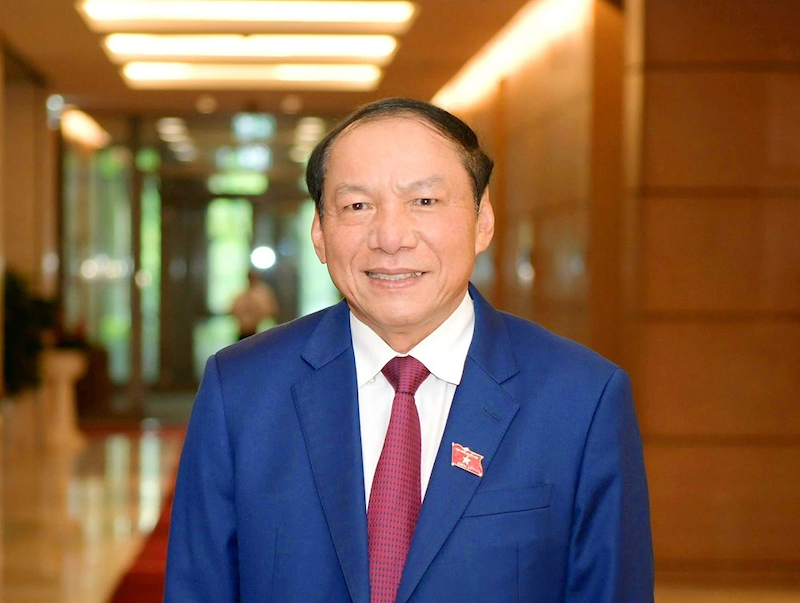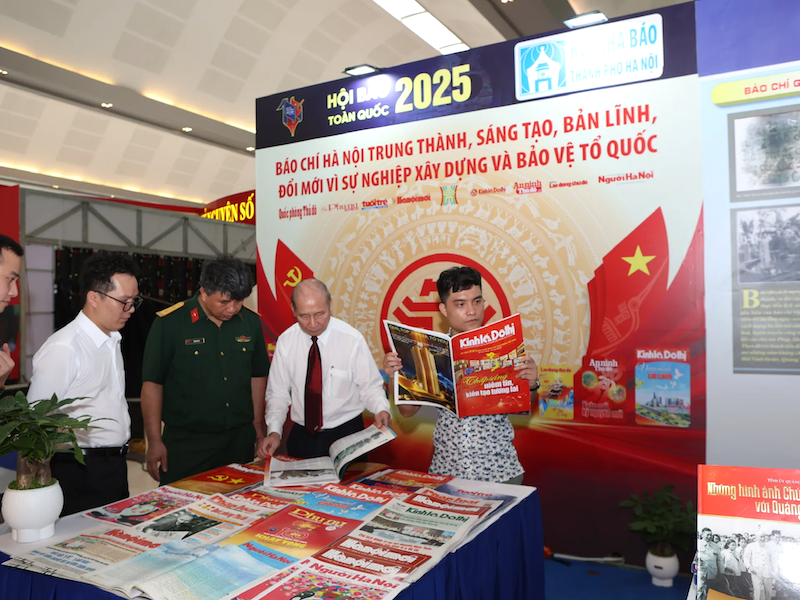Vietnam Revolutionary Press: Inspiring trust
Vietnam's leadership has acknowledged the role of revolutionary journalism on national defense and building.
In an interview with Van Hoa (Culture) Newspaper about the 100th anniversary of Vietnam’s Revolutionary Press Day, Minister of Culture, Sports, and Tourism Nguyen Van Hung emphasized the press's contributions to national defense and development over the past century.
What is the role of the Vietnamese press in the country’s protection and development?

Nguyen Van Hung, Minister of Culture, Sport and Tourism. Photo: Van Hoa Newspaper
Throughout past century, the Party and State have consistently placed great emphasis on the press, especially on the occasion of the 100th anniversary of Vietnam's Revolutionary Press (June 21, 1925–2025).
From its earliest days, under the leadership of President Ho Chi Minh, the press played a crucial role in revolutionary movements. Newspapers such as the Thanh Nien (Youth), Tranh Dau (Struggle), Doc Lap (Independence), and Cuu Quoc (National Salvation) served as platforms for communication and education, as well as vital instruments for mobilizing revolutionary movements.
During the Doi moi (Renewal) period, the press helped shape public discourse, paving the way for institutional reforms, unlocking resources, and contributing to the development of a socialist rule-of-law state "of the people, by the people, and for the people." Beyond its political and ideological role, journalism has grown into a vital part of Vietnam’s cultural and creative industries, evolving in a more professional, humane, and modern direction.
What are the achievements and challenges facing Vietnam's journalism in recent years?
The passage of the Press Law by the National Assembly in 2016 marked a pivotal milestone in institutionalizing press freedom along with state regulations.
The law introduced specific provisions regarding the rights and responsibilities of media outlets and journalists, as well as mechanisms for licensing, license revocation, sectoral inspection, and media planning, laying legal foundations for the sustainable development of the press.
Since then, the government has issued more than 31 legal documents to guide and regulate press activities, ensuring political alignment, mobilizing resources, and enhancing the quality of journalism.
However, the press faces mounting challenges as the media landscape continues to evolve, especially in the context of digital transformation and global integration. The explosive growth of cyberspace and digital communication platforms has complicated efforts to regulate information. Meanwhile, fake news and distorted content spread like wildfire, often outpacing mainstream media outlets, which are losing market share and traditional influence.
Moreover, some journalists' professional skills and ethical standards have not kept pace with technological advances and rising societal expectations. In addition, the lack of a digital verification system or trusted labeling for mainstream media is difficult for the public to distinguish legitimate news sources, undermining the press’s guiding role and its ability to influence public opinion.
These critical issues require a comprehensive, in-depth assessment for the development of Vietnam’s journalism sector.
What are opportunities and challenges brought about by the growth of digital technology and artificial intelligence (AI)?

The National Press Festival 2025 takes place on June 19-21 in Hanoi. Photo: Pham Hung/The Hanoi Times
One of the main challenges lies in the transition of audiences from traditional media to digital platforms. This transformation requires a fundamental shift in journalistic practice.
Today's journalists must be able to produce content for online platforms, including videos, livestreams, and podcasts, to appeal to younger audiences.
On the positive side, digital technologies bring vast opportunities. Journalists can leverage these tools to create multimedia content, infographics, and high-quality video features. Readers can interact directly with the press, providing reporters with real-time information and data. This interactivity improves storytelling and fosters a stronger sense of community around journalism.
The Ministry of Culture, Sports, and Tourism encourages media outlets to invest in and adopt these modern technologies. Digital tools, when used effectively, can enhance the quality of journalism, improving both its style and substance without compromising its core principles.
In this new era, journalism's mission is especially important: to act as a "conduit of knowledge and bridge of trust" between the Party, the State, and the people.
Journalism's role is multifaceted. It informs the public, shapes thinking, guides public perception, fosters social consensus, and strengthens national unity to fulfill the goals of renewal and development.
To face these new challenges, we must first change our mindset and embrace change.
As we gear up for the 14th National Party Congress, these pillars are emphasized once again with more concrete objectives as Vietnam readies for a new era of growth.
Could you elaborate on the three strategic breakthroughs supporting the development of journalism in the new era?
Vietnamese journalism is entering a transformative phase where opportunities intertwine with immense challenges, it requires some key changes for further development.
Institutional reform must come first to move journalism forward. A synchronized legal framework is needed to reinforce state management and create an open environment for press.
As we prepare to revise the Press Law, our focus will be on balancing press freedom with responsibility while maintaining transparency and oversight.
Another important issue is managing journalism in cyberspace with a focus on content quality.
At the same time, we must raise the professional and ethical standards of journalists to meet the expectations of today's public.
Equally important is the need to rethink infrastructure. Today's journalism demands more than physical office spaces but modern, digital-ready newsrooms to produce engaging content and deeply integrated with national data systems.
The ministry is committed to advising the Party and State on supportive policies for digital journalism, in accordance with Resolution No. 57 on innovation and national digital transformation.
We also recognize the importance of building partnerships, stronger domestic and international links, and socialized investment, especially from the private sector for modern systems.
In future development plans, media infrastructure should be viewed as hubs that nurture national knowledge and culture. These ideas should be reflected in Party Congress resolutions to ensure that future newsrooms serve as centers of influence, dialogue, and public trust.
Above all, it's necessary to maintain a deep sense of public service. Therefore, investing in journalism training is critical, especially professional ethics.
I believe that, in the near future, every newsroom should become a vital channel for fostering knowledge and trust. It should be a place where information is elevated into insight, inspiration, and lasting values for society.
What is your message conveyed on the occasion of the 100th anniversary?
I extend my sincerest congratulations to all journalists. I have deep respect and admiration for those who work tirelessly to cover culture, sports, and tourism. Every story reflects our society, preserves the essence of our nation, and honors the intelligence and integrity of the Vietnamese people.
To all journalists, especially those who report on culture, family life, sports, tourism, media, and publishing, I wish them to continue upholding what I call the "golden essence" of journalism: deep empathy and unwavering dedication.
You are the storytellers who ignite inspiration amid the ever-changing tides of society. Your contributions continue to enrich the image of a modern Vietnam: a nation deeply rooted in its cultural identity, steadily advancing toward prosperity, civility, and happiness.
Thank you for your time.








